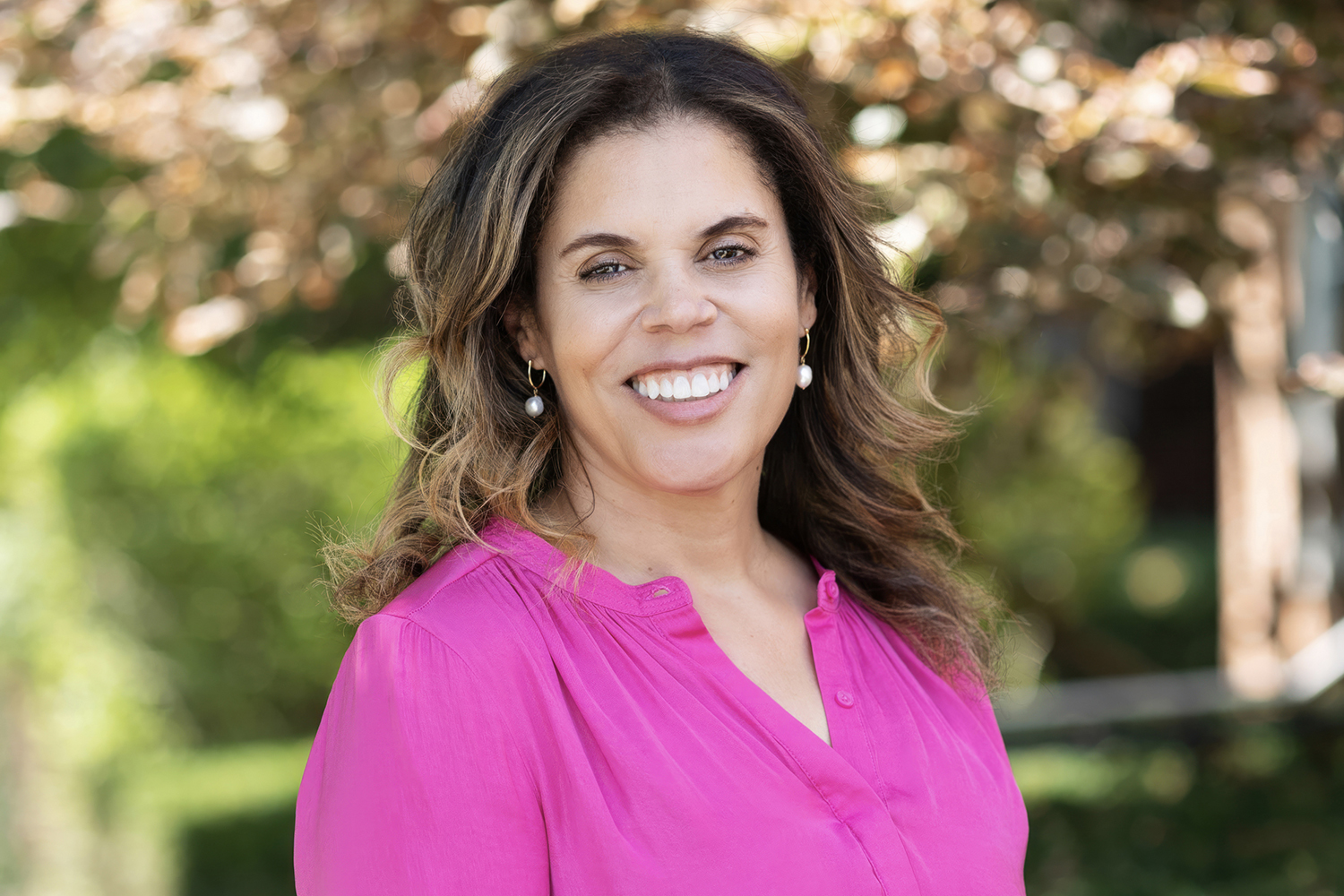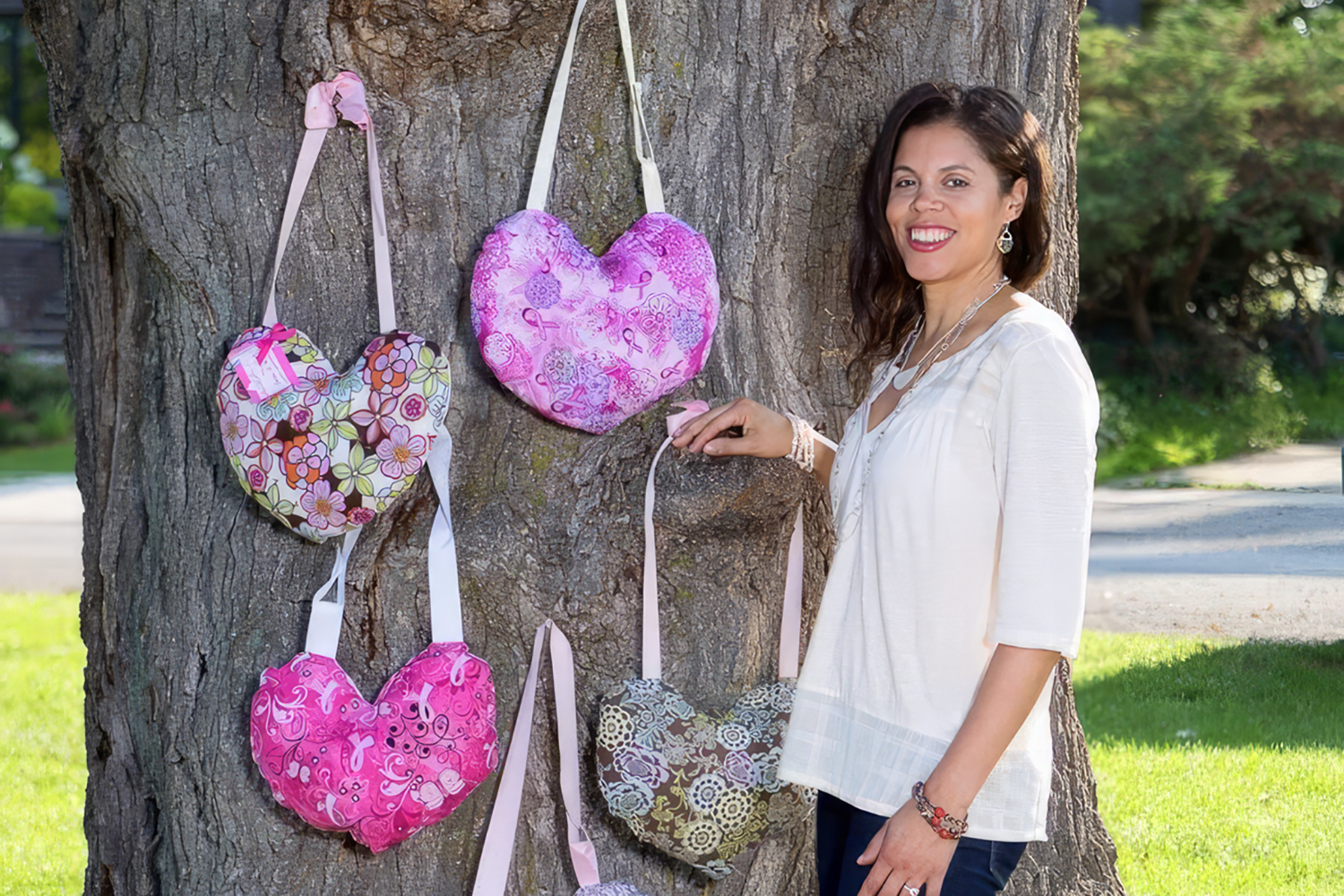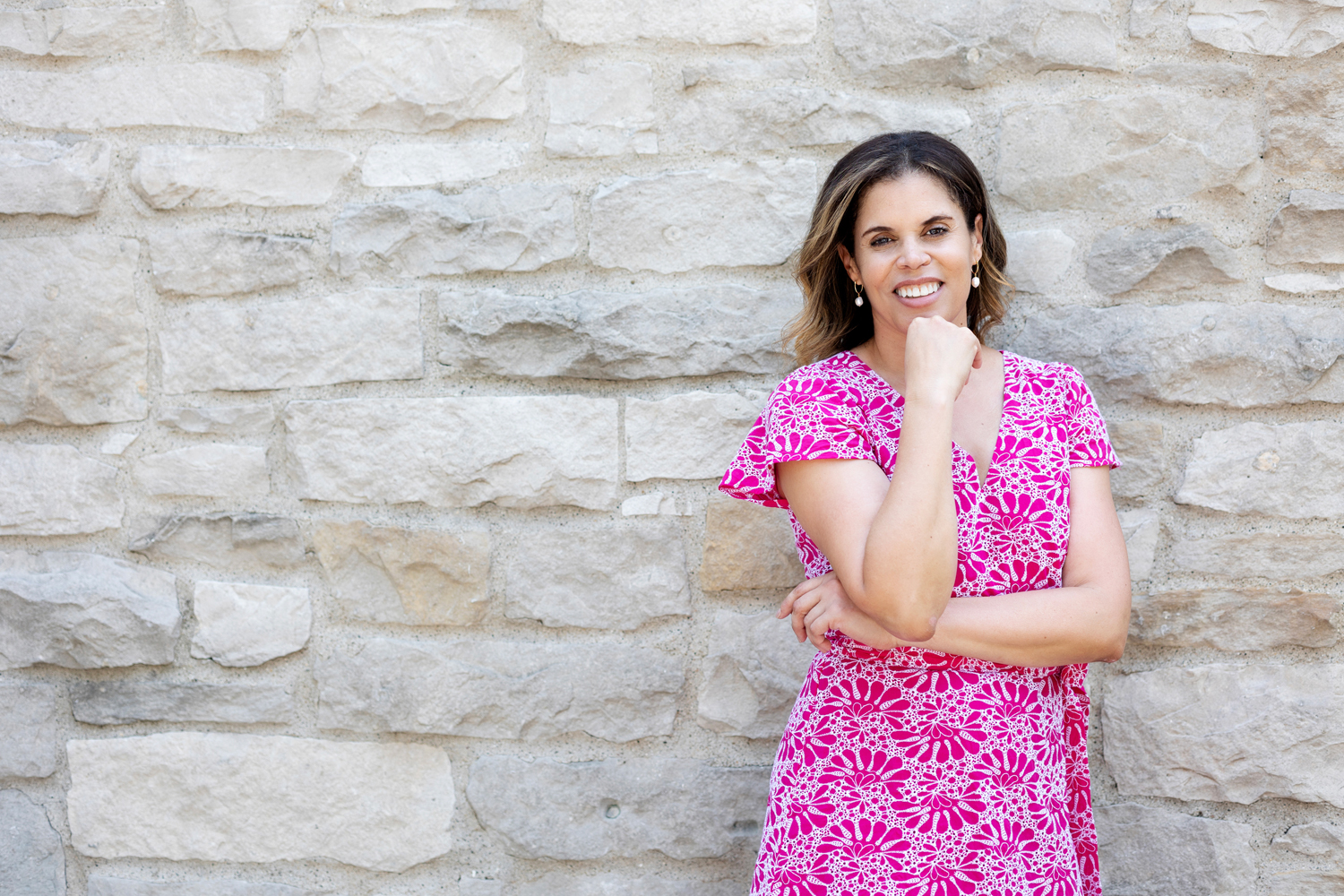ONE DAY IN 2011, Sabrina Mayhew was in the bathroom at home doing her hair when she noticed an indentation in one of her breasts. Mayhew, who lived outside of Detroit, had just turned 40. At the time, her life revolved around being a mom and caring for her three children.
But Mayhew had always had a strong interest in medicine. In college, she earned a bachelor’s degree in biology with hopes of becoming a doctor. After college, she felt called to learn more about research, earning a master’s degree in medical sciences. In the course of her studies, she spent time at a cancer research lab that focused on bone marrow transplants at Moffitt Cancer Center in Tampa, Florida. And in 2007, while her children were still young, she went to school part time to earn her nursing degree.
With her background in biology and science, Mayhew knew after discovering the indentation that she should have her breasts examined by a health care professional. She set up an appointment with a gynecologist, who performed a breast exam and referred Mayhew to a surgeon.
Still, Mayhew waited weeks before scheduling an appointment. “I was for sure in denial,” she says. “I didn’t even look to see that this [person] was a breast surgeon. Or maybe I thought in my head, this is just a breast specialist or something.”
She eventually scheduled an appointment with the surgeon, which led to tests that blur together in Mayhew’s mind. She recalls having a mammogram that didn’t conclusively show clear abnormalities. Mayhew was told she could return for a repeat mammogram in a few months to monitor any changes in her breast or proceed with a biopsy. Mayhew chose the latter option.

Even with her background in biology and science, Sabrina Mayhew felt overwhelmed by the news of her breast cancer diagnosis and treatment choices. Photo by Shaleena Cole
On Nov. 7, 2011, months after first noticing the dimpling in her breast, Mayhew learned and accepted the difficult truth. The biopsy revealed she had hormone receptor-positive ductal carcinoma in situ (DCIS) in her right breast. DCIS is considered stage 0 breast cancer, which means the abnormal cells are isolated inside milk ducts in the breast and have not invaded nearby tissue. Mayhew’s biopsy, which showed several distinct tumors inside the milk duct, led the breast surgeon to recommend a mastectomy. The surgeon also explained that Mayhew could choose an elective double mastectomy, an option some women with breast cancer choose for various reasons, including fear of cancer occurring in the other breast in the future. Mayhew decided to move forward with the double mastectomy—a choice that would ultimately reveal a rare cancer in her other breast.
After surgery, she was told the cancer in her right breast was invasive. In addition, Mayhew had Paget disease in her left breast, a rare type of breast cancer that can cause itching and changes on and around the nipple skin. Her doctors recommended she get chemotherapy, which could help eliminate any remaining traces of cancer in her body.
Mayhew braced herself for potential chemotherapy side effects, such as vomiting, mouth sores and hair loss. She sought the opinions of two oncologists, who recommended different types of chemotherapy. “I was so overwhelmed emotionally in the beginning that I didn’t even want to read the material or look things up,” Mayhew recalls. “I was in denial. I was in shock. I couldn’t deal with it.”
Another Option
Still undecided about which chemotherapy would be best for her, Mayhew went to Beaumont Hospital in Royal Oak, Michigan, to have her chemotherapy port placed. One of her oncologists there recommended she see a respected colleague, Anne Schott, a medical oncologist at the University of Michigan Rogel Cancer Center in Ann Arbor, to help her make up her mind about what type of chemotherapy to have.
Mayhew was happily surprised when Schott informed her she might not need chemotherapy at all. Instead, Schott recommended she get an Oncotype DX test that could gauge the aggressiveness of her breast cancer and predict how likely it would be to recur. (See “More About Recurrence Scores” below.) Schott procured tumor tissue samples from Mayhew’s mastectomy and sent them to a lab in California for testing. After a few weeks, Schott had results indicating that Mayhew had low-risk disease, and she could safely skip chemotherapy.
Still, those weeks of waiting for results brought out Mayhew’s doubts. In anticipation of the expected hair loss she would experience if she had to undergo chemotherapy, she went to a local wig store with her best friend, who had bravely cut her own hair as a sign of solidarity before Mayhew’s treatment. Mayhew’s apprehension continued, but she prayed that she was making the right decision.
“It was really stressful, that whole process,” Mayhew says. “Even when I moved forward with the Oncotype test, I was still a little like, ‘I hope this is the right thing to do.’”
Instead of chemotherapy, Schott recommended a brief course of radiation and a medication called tamoxifen that blocks the action of estrogen in the body and lowers the risk of cancer recurrence.
“We could never say there’s no risk of spread, but her risk was low, so it was better for her to go on anti-hormone therapy,” Schott says. “I think we’re all for making things easier, but I would also characterize [Mayhew’s treatment plan] as a more appropriate path.”
Looking back, Mayhew feels validated by her decisions and proud of her ability to get the necessary information in the midst of a breast cancer diagnosis. “This might have been the first real moment where I really stood up for myself and self-advocated,” Mayhew says. “The whole experience was life-changing for me. Everybody wanted to give their opinion, but it was really something that I did on my own.”
Tumor profiling tests help guide patients with early-stage breast cancer determine if chemotherapy is right for them.
The Oncotype DX breast cancer test analyzes the expression pattern or “signature” of 21 genes in breast tumor tissue. The test generates a recurrence score between 0 and 100 that indicates the likelihood of disease recurrence within 10 years of an original diagnosis if a patient takes hormone therapy.
A low recurrence score result means the cancer has a lower chance of returning and the patient has a lower chance of benefiting from chemotherapy. A high recurrence score result means the cancer has a higher chance of returning and the patient has a higher chance of benefiting from chemotherapy.
The Oncotype DX breast cancer test was launched for patients with early-stage hormone receptor-positive breast cancer in 2004 and was first recommended by the American Society of Clinical Oncology in clinical guidelines in 2007. A test for ductal carcinoma in situ (DCIS) became available in 2011, the same year Sabrina Mayhew received her DCIS diagnosis. Since then, Oncotype DX has become a widely available, clinically validated option for patients with early-stage breast cancer and DCIS.
“Nobody wants to do chemo, but I wanted to do what I needed to do to recover from the cancer that I had. [The Oncotype test] changed the entire course of my treatment,” Mayhew says.
A Heart for Helping
Mayhew has always had a heart for helping others. In the past, she had never hesitated to volunteer for local causes, but the kindness she experienced as a breast cancer patient and a growing passion for patient advocacy inspired her to think of new ways to give back.
During recovery from treatment in 2012, Mayhew launched the Angel Pillow Project, a nonprofit organization dedicated to supporting and comforting breast cancer patients. The idea was inspired by Lorraine Stevens, a local woman whose daughter had undergone breast cancer surgery at Beaumont and discovered her incisions made seat belts painful to wear during recovery. Stevens first made a pillow for her daughter to create a cushion between her surgery incisions and her car seat belt, then volunteered to continue making them for others in the hospital. Mayhew was one of many pleasantly surprised recipients of Stevens’ heart-shaped pillows.
“I just thought it was so wonderful that this woman who I didn’t even know had given me this pillow,” Mayhew says.
When she learned Stevens was moving out of town and would no longer be able to make the pillows regularly, Mayhew felt inspired to take up the mantle. For the Angel Pillow Project, Mayhew gathered a group of breast cancer survivors monthly at Beaumont to make heart-shaped pillows that patients could use to make themselves more comfortable after surgery, radiation or other cancer treatment. Each pillow included a handwritten note of encouragement, a nod to the organization’s goal of ensuring breast cancer patients feel physically and emotionally supported.

Inspired by a hospital volunteer who gave her a heart-shaped pillow after her mastectomy, Sabrina Mayhew started a nonprofit called the Angel Pillow Project to make pillows and support breast cancer patients. Photo courtesy of Sabrina Mayhew
During Mayhew’s recovery, her time was divided among her ongoing cancer treatment, her children and her new nonprofit. It wasn’t long before Beaumont took note of Mayhew’s efforts and offered her a job in 2014 as a coordinator for its Sharing & Caring program. Through the program, Mayhew organized support groups and educational programming for breast cancer patients and their families, and in 2017, she took on a new role at Beaumont as a radiation oncology nurse.
Mayhew also volunteered for breast cancer advocacy work. She served on the University of Michigan Breast Cancer Advocacy and Advisory Committee and participated in the National Breast Cancer Coalition’s Project LEAD, a scientific training program that provides advocates with the tools they need to serve on hospital boards and as part of state-level breast cancer advocacy organizations.
Mayhew has also participated on the boards of prominent advocacy groups like the National Breast Cancer Coalition and Gilda’s Club Metro Detroit, which now serves as the home for the Angel Pillow Project’s monthly pillow-making sessions. She also volunteered for organizations including the Tigerlily Foundation and the Sisters Network Greater Metropolitan Detroit chapter.
In 2012, Mayhew met breast cancer survivor Molly MacDonald, who was diagnosed with DCIS in 2005. Despite a 20-year age difference, the two bonded over their shared breast cancer journeys and formed a lasting friendship. MacDonald runs a charity called the Pink Fund, which provides up to 90 days of nonmedical financial assistance to help breast cancer patients in active treatment cover the basic costs of living.
MacDonald has encouraged Mayhew’s nursing career and pushed her to achieve her dream of earning a doctorate, an ambition Mayhew deferred for years while she got married, raised her children, went through a divorce, and endured cancer treatment and breast reconstruction. In 2019, Mayhew started work on her longtime goal of achieving a PhD in nursing.
For her doctoral dissertation, Mayhew drew from her experiences and sought to understand how and why Black breast cancer survivors become patient advocates. To capture these perspectives, Mayhew used a qualitative research method that incorporated photographs of advocates, capturing their participation in walks and other advocacy events, as well as their experiences during treatment. She says this research method, called Photovoice, “allowed my research participants to give me their experience from their perspective. By allowing them to share photos of their advocacy, I could get their authentic experience.”
MacDonald notes the ingenuity in Mayhew’s choice to allow the voices of Black advocates to come through in photos. “It was interesting to see how she was able to allow the individuals that she was working with to express their advocacy experiences without the use of leading questions,” MacDonald says. “I thought that was fascinating. She really is an outstanding academic.”
Mayhew received her doctoral degree in nursing in May 2023. She’s not sure where her advocacy efforts will lead her next, but she continues to explore opportunities to use her lived experience and professional training to support individuals living with cancer.
“I’m the one to call if somebody gets breast cancer,” Mayhew says. “So I have talked to a number of people who have just been diagnosed and just try to be encouraging.
“There’s this saying that breast cancer is like a sorority, the one that you didn’t want to join,” she adds. “But once you’re there, it’s a wonderful community of survivors. To be around such strong women, full of leadership and knowledge, who are passionate about advocating, that’s a wonderful thing.”
Cancer Today magazine is free to cancer patients, survivors and caregivers who live in the U.S. Subscribe here to receive four issues per year.





